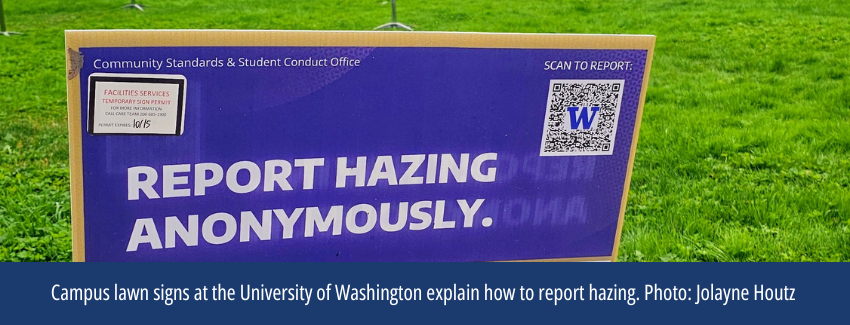Searching for clues about campus hazing culture
A university leader shares how families and students can find information about hazing on their college campus
As a parent sending my first kid to college this fall, I’m filled with excitement for the adventure ahead — but I’m also nervous about the situations I didn’t think to prepare them for.
Over the years, we’ve had countless family conversations about campus safety, including about hazing. And while I hope my student is prepared to navigate whatever comes their way, I still worry about the situations they may encounter taking those first steps toward independence on a new campus.
Some college information is easy to find. College majors, tuition, and the academic calendar are all a click away. But other important stuff, like campus safety, can be harder to uncover. Information about hazing is especially challenging for parents and students to locate.
Warning signs of hazing
When our family toured college campuses, I looked for clues about each school’s hazing culture.
The best way to do this is to tour campuses when classes are in session. You get to see how students interact with others.
Warning signs I look for include groups of students dressed in the same clothing. For example, if most students are wearing a variety of clothes, but a handful of students are all in Hawaiian shirts, bright red Crocs, or other clothing that is hard to source, that could indicate they are being required to wear certain items by their club, team, or organization as a form of intimidation or social isolation.
I also like to drive by the houses of student organizations. If you see older students enjoying leisure time while younger students around them are sweeping, mowing, or picking up trash, that’s a concern. I want to see a campus where students interact as equals.
New federal law brings hazing information to light
Families have been at a disadvantage when it comes to learning about college hazing. Most hazing incidents aren’t publicly disclosed or even reported. Hazing laws vary from state to state — and even within the same state, colleges define and address hazing in vastly different ways.
Soon, families will have a new tool that will create greater transparency, consistency, and accountability about hazing across all US colleges and universities.
The new federally mandated Stop Campus Hazing Act requires all higher education institutions to report hazing in their annual security report, implement hazing policies, and publish a Campus Hazing Transparency Report on their public websites by Dec. 23, 2025.
In addition, campus hazing policies must be implemented that include how to report suspected hazing. how hazing reports are investigated, and the research-based hazing prevention strategy the campus uses.
The new law will empower families like mine to make better-informed decisions, allowing us to see beyond what a campus looks like on paper to understand what’s really happening within student organizations.
If you’re curious about how this looks in practice, take a look at hazing transparency reports from these schools, which provide detailed data on hazing violations:
How to search for hazing information
How can you find hazing information for the schools you’re considering? A good place to start is HazingInfo’s Campus Lookup tool, which currently has hazing incident data for colleges and universities in nine states (and will soon expand to all 50 states).
If you are looking at a school outside those states, try an internet search for the college name plus the word “hazing.” You can also try searching on “student conduct” or “organizational conduct” to see if a hazing transparency report currently exists.
If you don’t find anything, don’t hesitate to call the school. Staff in the Dean of Student or Student Conduct offices are often the go-to contact for hazing-related concerns. Contact information for each school is provided on each institution’s page at HazingInfo.org when it is available.
Asking tough questions about hazing culture
Here’s another tip: Asking questions doesn’t just benefit your family. It also helps campus administrators understand what matters most to incoming students and parents. The more they hear from parents about their concerns about hazing, the more likely they will prioritize making that information available.
Until hazing is eliminated across the country, asking tough questions about hazing is one of the best ways to protect our students. The Stop Campus Hazing Act is a powerful step forward, giving families access to the information they need to choose the campus that is right for them.




